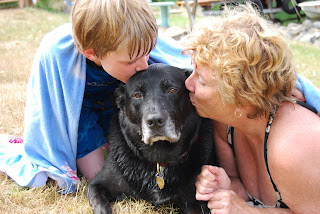
Traditional wisdom would have it that "man," or humans, are the most intelligent life form on earth. We, the humans, believe that our larger brains (relative to body mass, dolphins and whales actually have bigger brains) confer us with greater intelligence. I would point to simple behavioral attributes of humans – war, pestilence, environmental degradation – and make the case that perhaps brain size is overrated, but I digress.
Language is often pointed to as the coup d'état proving man's superiority to beasts. Surely, if animals were so smart we argue, they would develop language, but alas, they don't. We shake our heads at their sweet but dumb simplicity. Poor things.
I've lived with wolves in my parlor for many years. Initially, I appreciated how they learned a little English with their inferior canine brains: sit, down, stay, and occasionally, when they wanted to, come. Oh, yeah, and w-a-l-k, c-a-r, and g-o. And then alk-way, ar-cay, and o-gay. Not that they were smart or anything, learning to interpret spoken and spelled English as a second language not only across culture but across species.
As time went by, we noticed we were spelling more words as our dumb dogs' English vocabularies grew. I noticed that I could say things like "Go find Maya," and Nicholai would dash to the car, seeming to understand we'd need to drive to Maya's house to find her. It seemed a lot to put together for an inferior mind and I became more impressed with the dogs' understanding of our language. On many a w-a-l-k with Nicholai, he appeared to read my mind, reacting to my thoughts even when we were not connected by a leash. Once I noticed a dark hooded figure skulking along the edge of the brush in the distance. Nicholai was sniffing driftwood about two hundred feet away from me, but at the moment I decided the mysterious person was suspicious, he lifted his head and glanced not toward me, but toward the figure, and raised his hackles. I imagined he felt a molecular shift in my energy or smelled a change in my chemistry, but how did he know about the dubious character? Not via language as we tend to think of it, but it seemed pretty sophisticated communication.
I began to observe the dogs more closely – their interactions with each other as well as with us. They don't use words like we do, but goodness me, they utilize countless variations of motion and stance, ear placement, eye direction, tail carriage, woof, ruff, bark, whine, and growl. A deaf man once commented to me (in sign language) that people with normal hearing have a repertoire of body language and facial expression roughly equivalent to a wooden Indian, relying heavily, as we do, on the spoken word. With a chuckle, I remembered his comment as I watched Nicholai communicate with my non-dog owning brother one day during a Christmas visit.
Joe plunked down on the couch and set a large blueberry muffin on the end table beside him. Nicholai trotted over and sat squarely in front of Joe, facing him. I didn't pay much attention, reading a book in a rocking chair nearby. After a couple of minutes, my brother asked with a nervous chuckle, "Uh, Mary, why is Nicholai staring at me?" Raising my eyes over my book, I looked at Nicholai. Joe looked at me with raised eyebrows and a shrug.
Nicholai sat erect and purposeful, staring at Joe. His gaze was soft, his ears alert, but relaxed. His tail wagged gently on the floor behind him; "I come in peace, but with a purpose" by all accounts. He stared at Joe's face, then raised one eyebrow and flicked his eyes toward the end table, subtle, but unmistakable; then lowered the eyebrow and returned his gaze to Joe. I laughed out loud. "Joe, you're smart," I said. "You're a scientist, you figure it out." I went back to my book. A moment later, I heard Joe laugh. "Ohh. He wants my muffin. Should I give him some?" "Entirely up to you."
Nicholai's meaning was crystal clear, syntax, grammar, even etiquette appeared present. So I wonder, do animals really not use language, or are we – like the stereotypical hearing person – just too "wooden" in our approach to see any language other than our own?










